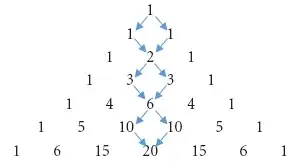Prove that $$\binom{2n}{n}>\frac{4n}{n+1}\forall \; n\geq 2, n\in \mathbb{N}$$
$\bf{My\; Try::}$ Using $$(1+x)^n = \binom{n}{0}+\binom{n}{1}x+\binom{n}{2}x^2+........+\binom{n}{n}x^n$$
and $$(x+1)^n = \binom{n}{0}x^n+\binom{n}{1}x^{n-1}+\binom{n}{2}x^{n-1}+........+\binom{n}{n}$$
Now Coefficients of $x^n$ in $\displaystyle (1+x)^{2n} = \binom{2n}{n} = \binom{n}{0}^2+\binom{n}{1}^2+\binom{n}{2}^2+.....+\binom{n}{n}^2$
Now Using $\bf{Cauchy\; Schwarz}$ Inequality
$$\left[\binom{n}{0}^2+\binom{n}{1}^2+\binom{n}{2}^2+.....+\binom{n}{n}^2\right]\cdot \left[1^2+1^2+....+1^2\right]\geq \left[\binom{n}{0}+\binom{n}{1}+\binom{n}{2}+.....+\binom{n}{n}\right]^2=2^{2n}=4^n>4n\forall n\geq 2,n\in \mathbb{N}$$
So $$\binom{2n}{n} = \binom{n}{0}^2+\binom{n}{1}^2+\binom{n}{2}^2+.....+\binom{n}{n}^2>\frac{4n}{n+1}\forall n\geq 2,n\in \mathbb{N}$$
My question is , Is my proof is right, If not then how can i solve it.
Also plz explain any shorter way, Thanks
